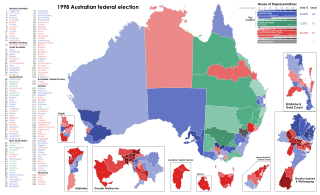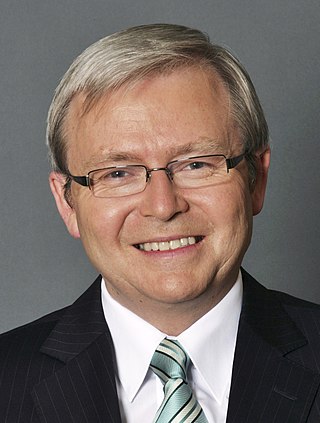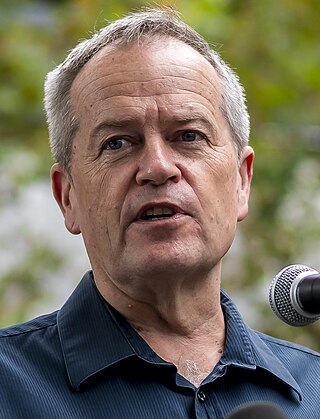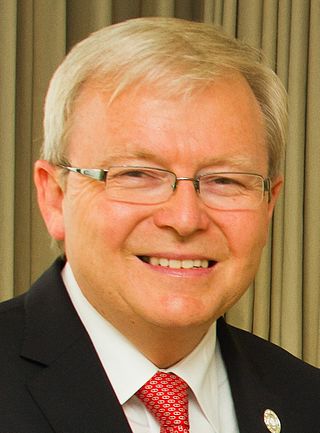
Simon Findlay Crean is an Australian politician and trade unionist. He was the Member of Parliament for Hotham from 1990 to 2013, representing the Labor Party, and served as a Cabinet Minister in the Hawke, Keating, Rudd and Gillard governments. He was the Leader of the Labor Party and Leader of the Opposition from November 2001 to December 2003.

Kim Christian Beazley is an Australian former politician and diplomat. He was leader of the Australian Labor Party (ALP) and leader of the opposition from 1996 to 2001 and 2005 to 2006, having previously been a cabinet minister in the Hawke and Keating governments. After leaving parliament he served as ambassador to the United States from 2010 to 2016 and governor of Western Australia from 2018 to 2022.

Kevin Michael Rudd is an Australian diplomat and former politician who served as the 26th prime minister of Australia, from 2007 to 2010 and June 2013 to September 2013, holding office as the leader of the Australian Labor Party (ALP). Rudd is the 23rd and current Ambassador of Australia to the United States since 2023.

The 1998 Australian federal election was held to determine the members of the 39th Parliament of Australia. It was held on 3 October 1998. All 148 seats of the House of Representatives and 40 seats of the 76-seat Senate were up for election. The incumbent centre-right Liberal/National Coalition government led by Prime Minister John Howard of the Liberal Party and coalition partner Tim Fischer of the National Party defeated the centre-left Australian Labor Party opposition led by Opposition Leader Kim Beazley, despite losing the nationwide popular and two-party preferred vote. However, the Australian Labor Party gained seats from the previous election.

Julia Eileen Gillard is an Australian former politician who served as the 27th prime minister of Australia from 2010 to 2013, holding office as leader of the Australian Labor Party (ALP). She previously served as the 13th deputy prime minister of Australia from 2007 to 2010, under Prime Minister Kevin Rudd. She is the first and only female to hold either office in Australian history.

Jennifer Louise Macklin is an Australian former politician. She was elected to federal parliament at the 1996 federal election and served as the deputy leader of the Australian Labor Party (ALP) from 2001 to 2006, under opposition leaders Simon Crean, Mark Latham and Kim Beazley. After the ALP won government at the 2007 election, she held ministerial office under Kevin Rudd and Julia Gillard, serving as Minister for Families, Community Services and Indigenous Affairs (2007–2013) and Minister for Disability Reform (2011–2013). She retired from parliament at the 2019 election.

Wayne Maxwell Swan, often colloquially referred to as Swanny, is an Australian politician serving as the 25th and current National President of the Labor Party since 2018, previously serving as the 14th Deputy Prime Minister of Australia and Deputy Leader of the Labor Party from 2010 to 2013, and the Treasurer of Australia from 2007 to 2013.

The 2007 Australian federal election was held in Australia on 24 November 2007. All 150 seats in the House of Representatives and 40 of the seats in the 76-member Senate were up for election. The election featured a 39-day campaign, with 13.6 million Australians enrolled to vote.

William Richard Shorten is an Australian politician and former trade unionist currently serving as Minister for Government Services and Minister for the National Disability Insurance Scheme since 2022. He previously served as leader of the opposition and leader of the Australian Labor Party (ALP) from 2013 to 2019. He has also served as a member of parliament (MP) for the division of Maribyrnong since 2007, and held several ministerial portfolios in the Gillard and Rudd governments from 2010 to 2013.
In Australian politics, a leadership spill is a colloquialism referring to a declaration that the leadership of a parliamentary party is vacant and open for contest. A spill may involve all or some of the leadership positions. Where a rival to the existing leader calls for a spill it may also be called a leadership challenge. When successful, it is often said that the former leader has been "rolled". In Australian English the colloquial use of the word "spill" seems to have begun in the mid-1940s with the contest to replace Prime Minister John Curtin after his death on 5 July 1945.

A leadership spill occurred in the Australian Labor Party on 24 June 2010. Kevin Rudd, the prime minister of Australia, was challenged by Julia Gillard, the deputy prime minister of Australia, for the leadership of the Australian Labor Party. Gillard won the election unopposed after Rudd declined to contest, choosing instead to resign. Gillard was duly sworn in as prime minister by Quentin Bryce, the Governor-General, on 24 June 2010 at Government House, becoming Australia's first female prime minister.

The Gillard government was the Government of Australia led by the 27th Prime Minister of Australia, Julia Gillard, of the Australian Labor Party. The Gillard government succeeded the first Rudd government by way of the Labor Party leadership spill, and began on 24 June 2010, with Gillard sworn in as Prime Minister by the Governor-General of Australia, Quentin Bryce. The Gillard government ended when Kevin Rudd won back the leadership of the Australian Labor Party on 26 June 2013 and commenced the second Rudd government.

A leadership spill in the Australian Labor Party, the party of government in the Parliament of Australia, was held on 27 February 2012 at 10 am AEDT, followed by a ballot. The Prime Minister, Julia Gillard, announced the spill at a press conference on 23 February 2012, following the resignation of the Minister for Foreign Affairs, Kevin Rudd, from his cabinet position after months of speculation that he intended to challenge Gillard for the leadership. Rudd announced his intention to seek the leadership at a press conference on 24 February.

A leadership spill of the Australian Labor Party (ALP), the official opposition party in the Parliament of Australia, was held on 28 January 2005. The outgoing Opposition Leader, Mark Latham, stood down 13 months after assuming the leadership in December 2003. Kim Beazley was the only contender for the ballot, and was therefore elected unopposed.
Two leadership spills of the Australian Labor Party (ALP), the official opposition party in the Parliament of Australia, were held on 16 June 2003 and 2 December 2003, respectively. The Opposition Leader, Simon Crean, won the ballot in June against former opposition leader Kim Beazley, but resigned as leader in late November after losing support from his colleagues and did not contest the December ballot which Mark Latham won against Kim Beazley.

A leadership spill in the Australian Labor Party, the party of government in the Parliament of Australia, was held on 21 March 2013. Prime Minister Julia Gillard called a ballot for the Leadership and Deputy Leadership of the Labor Party for 4.30pm, following a press conference by former Labor Leader and Regional Minister Simon Crean over persistent leadership tensions. At the caucus meeting, no alternative candidates nominated for the positions, and so Gillard and Wayne Swan were re-elected unopposed.

A leadership spill in the Australian Labor Party, the party then forming the Government of Australia, took place on 26 June 2013 at 7:00pm AEST. Prime Minister Julia Gillard called a ballot for Leader and Deputy Leader of the Labor Party live on Sky News Australia at 4:00pm, following persistent leadership tensions. She stated that she would retire from politics if she lost the vote, while calling on any would-be challengers to pledge to do the same if they lost. In a press conference held shortly after Gillard's announcement, backbencher and former Prime Minister Kevin Rudd announced that he would challenge Gillard, whilst also pledging to step down if he did not win the vote. At the ALP caucus meeting, Rudd was elected Leader of the Labor Party, with the caucus voting 57–45 in his favour.

The second Rudd government was the federal executive Government of Australia led by Prime Minister Kevin Rudd of the Australian Labor Party. It commenced on 27 June 2013 and ceased on 18 September 2013. Rudd had previously served a term as Prime Minister from 2007 to 2010 and been replaced by his deputy Julia Gillard, following an internal party spill. Rudd regained the Labor Party leadership by successfully re-challenging Gillard in a June 2013 party spill. On 5 August, Rudd called an election for 7 September 2013, which resulted in the defeat of his government by the Liberal/National Coalition led by Opposition Leader Tony Abbott.

A leadership election was held in October 2013 to select Kevin Rudd's replacement as leader of the Australian Labor Party and Leader of the Opposition. Bill Shorten was elected party leader, and Tanya Plibersek was later confirmed as deputy leader.

The Australian Labor Party held a leadership election on 22 November 2001, following the resignation of Kim Beazley after the party's defeat at the 2001 federal election. Deputy leader and Shadow Treasurer Simon Crean was elected unopposed as Beazley's replacement, thus becoming Leader of the Opposition.
















